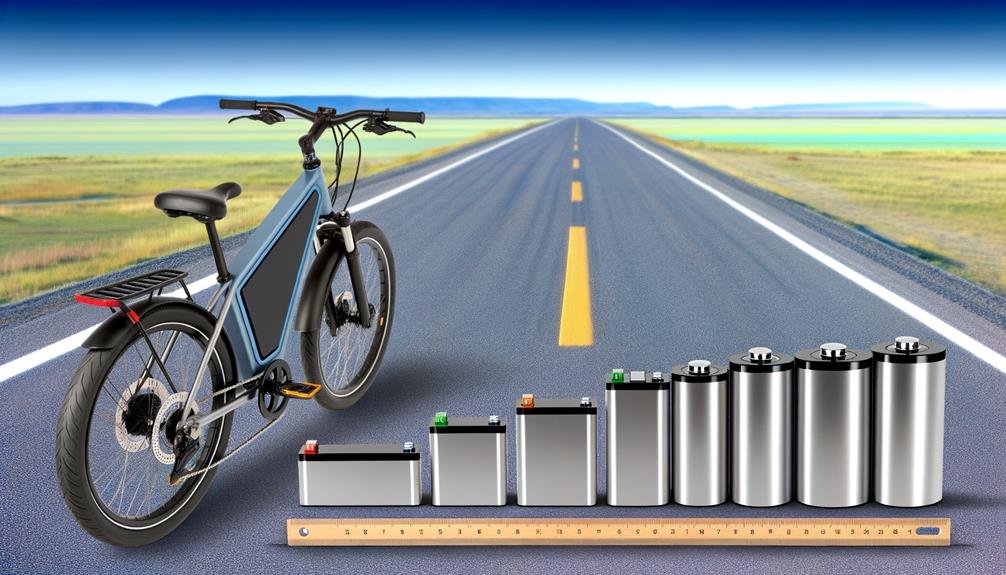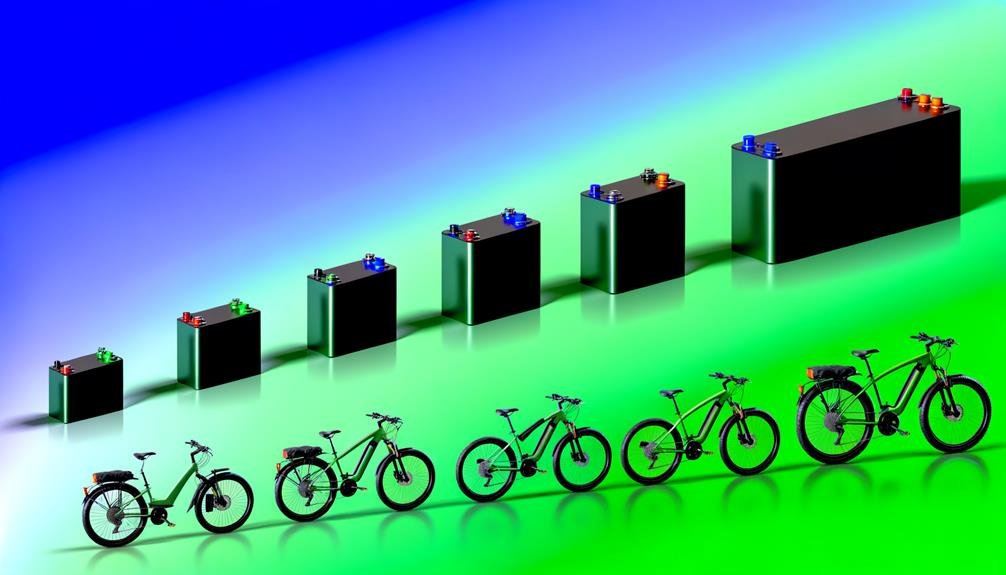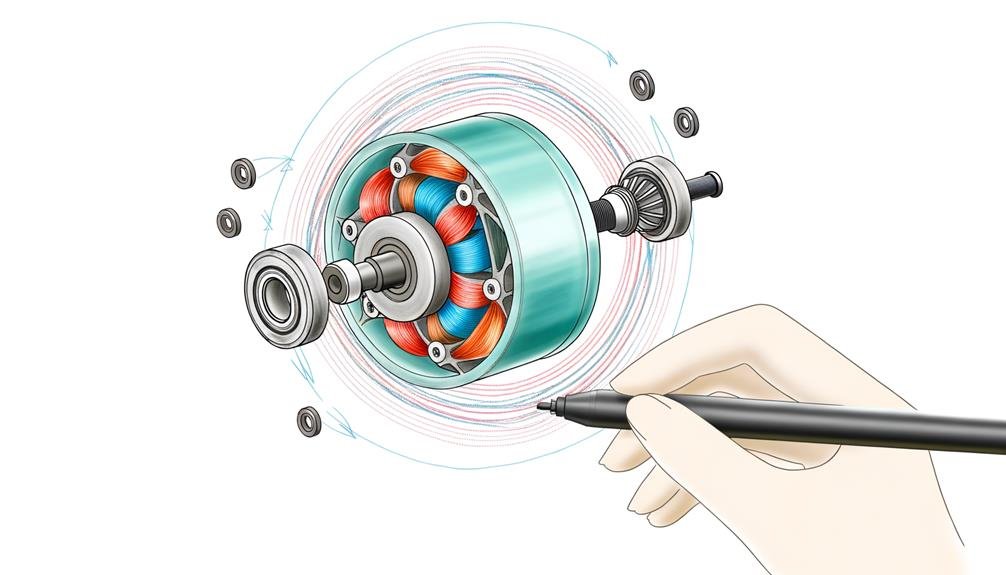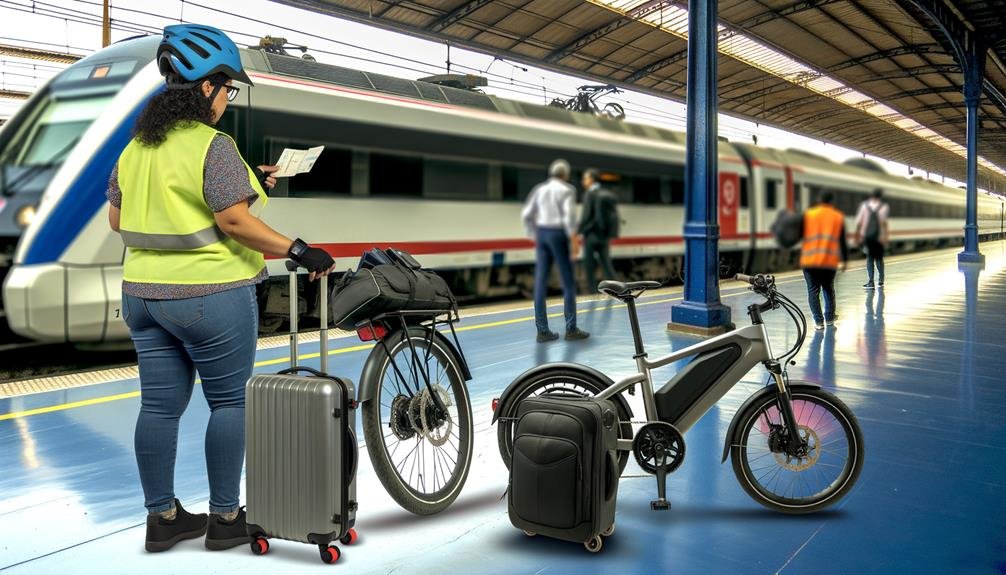Charles Miller is a veteran bike enthusiast with over 12 years of experience dealing with bikes as a mechanic. Despite immense love and expertise for...
Imagine cruising down a winding bike path, the breeze against your face, your e-bike humming beneath you, when suddenly your bike slows to a stop – the battery's dead. We've all been there, and it's not a pleasant experience.
So, one question that often comes up when considering an e-bike purchase is 'How big should my e-bike battery be?' It's a critical factor, intertwined with the bike's range, performance, weight, and even cost. But before we get into the nitty-gritty of battery sizes, let's take a step back and understand what it all means.
After all, there's more to this than you might initially think.
Key Takeaways
- Battery size directly impacts the cost, performance, and range of an ebike.
- Larger batteries offer longer ride times and faster speeds, but they come at a higher price and make the bike heavier.
- Smaller batteries may save money upfront, but they may not provide the desired range or speed.
- Terrain, riding style, and throttle usage all play a role in determining the appropriate battery size for optimal efficiency.
Understanding Ebike Battery Basics
Understanding ebike battery basics is crucial, as the battery size not only significantly impacts the overall cost of your electric bike, but also determines how far and fast you can ride. It's like the heart of your ebike, pumping energy to the motor and allowing you to travel.
Larger batteries tend to be more expensive, but they offer longer ride times and faster speeds. On the other hand, a smaller battery saves you money upfront, but may not provide the range or speed you desire.
Now, let's break it down a bit. An amp hour battery, for example, measures the amount of energy your battery can store. It's like a fuel tank in a car; the larger it is, the farther you can go on a single charge. However, it's not just about size. Different motor sizes need different battery capacities.
Fat tire e-bikes often have larger batteries due to increased drag, while manufacturers usually match the battery size to the motor power for efficiency.
Keep in mind that choosing the right battery size for your electric bike balances both cost and performance. It's an important decision that shapes your ebike experience.
Importance of Ebike Battery Size
Having grasped the basics of ebike batteries, let's now explore why the size of the battery plays such a pivotal role in your electric biking experience. The importance of ebike battery size can't be overstated as it directly influences your ride distance, cost, and overall satisfaction.
A large battery may seem like a great choice, promising longer rides. But remember, it also means a heftier price tag and a heavier e-bike. If you're a casual rider, a smaller, lighter battery could be perfect. The size battery you choose should match your lifestyle and budget.
Consider the motor size too. Different motor sizes demand specific e-bike batteries. If you've got a 500W motor, you'll need a proper battery that can supply the power it requires. It's all about balance!
The terrain and your riding style also play a part. If you love speed and challenging landscapes, you'll need a beefier battery. And don't forget, throttle usage affects battery life as well.
In a nutshell, the importance of ebike battery size lies in its influence on cost, performance, and ride comfort. Choose wisely, fellow cyclists!
Estimating Your Ebike's Range

Let's dive into how to estimate your ebike's range, taking into account factors such as your riding distance, motor size, and the terrain you'll be tackling. When you're on your electric bike, battery capacity and motor size are key elements affecting how many miles you can cover on a single charge.
| Factor | Impact on Range |
|---|---|
| Riding Distance | Longer distances need a larger battery pack |
| Motor Size | Bigger motors drain batteries faster |
| Terrain | Rough terrain requires more power, reducing range |
| Speed & Throttle Usage | Higher speeds and constant throttle use reduce range |
Estimating your ebike's range isn't just about the amp hours on your battery, but also how you plan to ride. For example, using pedal assist sparingly can extend your range significantly. Remember, a larger battery will weigh more, which could affect your bike's handling, especially if you're a heavier rider. But it's also important to remember that a larger battery can offer you more freedom and flexibility in your travels. Your ebike's range is ultimately a balance between your riding style, your bike's specs, and the battery's capacity.
Factoring Terrain and Riding Style
Now, let's consider how your riding style and the terrain you ride on can affect your ebike's battery size.
If you're tackling hilly areas or ride aggressively, you'll likely need a larger battery.
On the other hand, a smaller battery might suffice for flat terrains or if you're a pedal-assist rider.
Assessing Your Riding Style
To choose the right ebike battery size, you need to take a good look at your riding style and the terrain you'll typically be navigating.
Here's a simple breakdown of what to consider:
- The terrain: Hilly or rough areas will require more battery power.
- Your riding style: If you're going fast or using the throttle often, you'll drain the battery quicker.
- Your miles: Planning long rides? A larger battery is a must.
- Your electric bike's motor size: Bigger motors need bigger batteries.
Terrain Type Considerations
Factoring in both the type of terrain and your riding style is crucial when determining the best battery size for your ebike.
In terrain type considerations, it's clear that hilly or off-road paths demand more power. This means larger batteries are essential to keep your electric bike running smoothly.
On the other hand, if you're a speed demon or you love uphill adventures, you'll need even larger battery packs. This is because high speeds and uphill rides drain your ebike's battery faster.
Battery Size Implications
While it's clear that both terrain and riding style play a significant role in determining the optimal ebike battery size, it's also important to consider the battery size implications of your choice.
- Bigger Battery: With a larger battery, you'll have the amp needed for riding in hilly areas or at high speeds. There's freedom in not constantly worrying about your electric bike's battery life.
- Terrain: Rough terrains drain batteries quickly. A bigger battery means more power to tackle those challenging rides.
- Riding Style: Aggressive, high-speed riding requires more power. A larger battery accommodates this style easily.
- Leisurely Rides: For leisurely, flat-terrain rides, a smaller battery might be enough.
Battery Size and Ebike Weight
When it comes to the relationship between battery size and e-bike weight, it's important to remember that larger batteries typically weigh more, affecting both the performance and maneuverability of your ride. As we explore the world of Electric Bikes together, let's delve into the factors that play into this crucial balance.
Different battery sizes are needed for different motor sizes, and this is a key factor to consider. For instance, a 750W motor will need a larger battery than a 250W motor, and this will naturally increase the overall weight of your e-bike. Similarly, if you're a fan of fat tire e-bikes, be aware that they often sport larger batteries to accommodate for the increased drag, adding to the bike's total weight.
One point regarding battery size and ebike weight that often flies under the radar is the impact of rider weight. Heavier riders may benefit from larger batteries to balance the increased motor workload, but this will also add to the weight of the e-bike.
Lastly, don't forget about the possibility of a secondary battery, which can provide extra range but will also increase your e-bike's weight.
Choosing the Right Battery Size

Let's start to understand how battery capacity plays a role in choosing the right ebike battery size.
Your ebike usage and range, influenced by factors like speed, terrain, and throttle usage, are key aspects to consider.
I'll guide you through the process of determining what battery size is suitable based on these parameters to ensure you get the most out of your ebike.
Understanding Battery Capacity
Grasping the concept of battery capacity is crucial when choosing the right ebike battery size. As I journeyed into understanding battery capacity for my first e-bike, I realized that a huge battery doesn't necessarily mean it's the best possible choice. Here's why:
- Range: A large battery can cover more miles at a time, but it also means a heavier bike.
- Speed: Going faster drains the battery quicker. So, if speed is your thing, you'll need a larger battery.
- Usage: How often and how far you travel on your e-bike matters when choosing your battery size.
- Charging: Larger batteries take longer to charge.
Don't let the size fool you – it's about finding the balance that suits your specific needs.
Ebike Usage and Range
Building on our understanding of battery capacity, it's time to explore how ebike usage and range factor into choosing the right battery size.
If you're going to ride a lot of distance, you'll need a battery that can keep up. The bike industry has various options, depending on your needs. Remember, your fully charged battery will take you only as far as its capacity allows. Factors like speed, terrain, and your riding style will affect this.
Bigger batteries can go further, but they're heavier and cost more. It's all about balancing your ebike usage and range with your budget and physical abilities.
Ultimately, choosing the right battery size enhances your biking experience.
Frequently Asked Questions
What Is a Good Size Battery for an E-Bike?
Determining the right battery size for your e-bike depends on your specific needs. If you're planning long rides, a larger capacity battery is advisable. But for short commutes, a smaller battery will do just fine.
Will a Bigger Battery Make My Ebike Faster?
No, a bigger battery won't make your ebike faster. It'll give you more range for longer rides, but speed depends on the motor, not the battery. It's about finding the right balance for your needs.
How Far Can an Ebike Go on a 20Ah Battery?
On a single charge, a 20ah battery can take me on a wondrous journey of about 60-70 miles, depending on my ebike's efficiency. It's like having a magical carpet ride across the city.
Is 500Wh Battery Enough for an Ebike?
In my experience, a 500Wh battery is generally enough for most ebike rides. However, it really depends on factors like your riding style, the terrain, and the weight you're carrying. It's all about balance.
Conclusion
Choosing the right e-bike battery size can feel like a balancing act, but it's crucial to get it right. Surprisingly, a study found that 20% of e-bike owners wish they'd opted for a larger battery. Don't be part of that statistic.
Always consider your range needs, terrain, and riding style. Remember, it's better to have a bit more power than you need, rather than find yourself running short.
Make the investment worthwhile.

Charles Miller is a veteran bike enthusiast with over 12 years of experience dealing with bikes as a mechanic. Despite immense love and expertise for his Tacoma, he rides his Trek Ebike more. Anytime you meet him, you’ll either hear him talking about Bikes, or writing about all things bikes and cars on this blog.
More Posts


